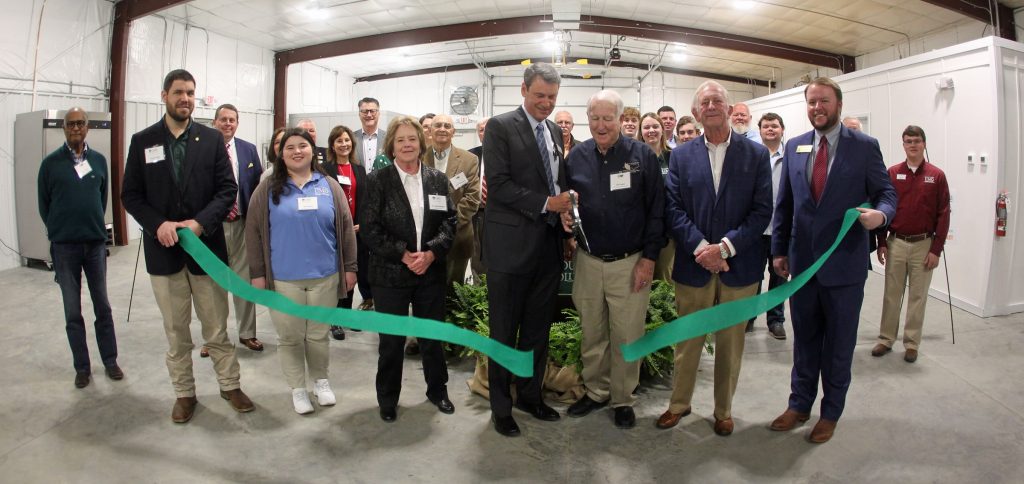UMO cuts ribbon on new Agricultural Commodity Building

At the ribbon cutting for the University of Mount Olive Agricultural Commodity Building were, front from left, Director of the Lois G. Agribusiness Center Edward Olive, UMO ag student Anna Brown, Dean of the School of Agricultural and Biological Sciences Dr. Sandy Maddox, President Dr. H. Edward Croom, Chairman of the N.C. Tobacco Trust Fund Commission Bill Teague, UMO Board of Trustees member Donnie Lassiter and Director of Agricultural Development and Farmland Preservation Trust Fund Evan Davis.
MOUNT OLIVE – About 100 people gathered at the University of Mount Olive’s Kornegay Student Farm for the ribbon cutting of its new agricultural commodity building.
Named for the project’s lead donors, the North Carolina Tobacco Trust Fund Commission Agricultural Commodity Building is a first of its kind in a private college agriculture program setting in North Carolina.
According to Dr. Sandy Maddox, dean of the School of Agriculture and Biological Sciences at UMO, the 5,000 square feet building will serve as a commodity handling facility, food hub and training and demonstration site for students and local farmers. “The building was constructed to meet GAP certification standards and is equipped with cooler storage capacity, cleaning, grading, and sorting capacity, and limited freezer capacity,” Maddox said.
She indicated that the facility will handle, store and process commodities grown at the Kornegay Student Farm and consolidate commodities from local growers to distribute to various market channels including CSAs and mobile farmers markets.
“The agricultural commodity building will create a hands-on educational environment for students and farmers to observe operational and production practices that could be implemented on the family farm,” Maddox said. “It will also provide a platform to demonstrate traditional and organic agronomic and horticultural crop production diversification principles, strategies and market development options with business models for new and existing farmers, resulting in risk reduction through demonstration and education.”
Representatives from the project’s funding partners including Evan Davis, director of the Agricultural Development and Farmland Preservation Trust Fund; and Bill Teague, chairman of the N.C. Tobacco Trust Fund Commission Board; praised the work being accomplished at the university to train and educate the next generation of agricultural leaders.
Davis noted the growing number of farmland acres being lost annually to development. “Programs such as these at the University of Mount Olive are critical to the sustainment of agriculture in North Carolina,” he said.
“We have partnered with the University of Mount Olive on many projects and this latest will add significant value to the University’s ag program and the local community,” Teague said.
UMO President Dr. H. Edward Croom thanked the N.C. Tobacco Trust Fund Commission, the Agricultural Development and Farmland Preservation Trust Fund and private donors. “Thank you for your belief in what we are doing and your support to make it happen,” he said. “Our location as an educational institution in the heart of agricultural country provides us with unique opportunities and sets us apart from any other private college in North Carolina. Today’s ribbon cutting is an expansion of our role to serve as a leader in agricultural education and community outreach.”
UMO Board of Trustees member and contributor Donnie Lassiter praised the university and specifically Dr. Maddox and Dr. Croom for their leadership. “What all of them are doing here is giving these students the opportunity to come and get an education in agriculture, get a good career and provide for their families not only here in North Carolina, but everywhere.”
Construction on the commodity building began in November 2021 and was completed in February. The new facility will be used immediately to expand production and meet the needs of the community for a central distribution location. Future expansion plans include commodity processing, which will add value to and increase profitability.
“Students and farmers will be trained to understand and implement food safety handling principles, organic production, handling and marketing opportunities and value-added diversification strategies for production and marketing to allow for operational diversification and increased profitability potential,” Maddox said.
— From University of Mount Olive Public Relations



